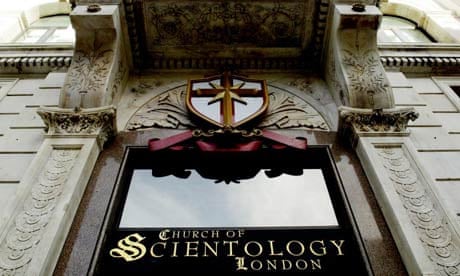A teenager who was facing legal action for calling the Church of Scientology a cult has today been told he will not be taken to court.
The Crown Prosecution Service ruled the word was neither "abusive or insulting" to the church and no further action would be taken against the boy.
The unnamed 16-year-old was handed a court summons by City of London police for refusing to put down a placard saying "Scientology is not a religion, it is a dangerous cult" during a peaceful protest outside the church's headquarters near St Paul's Cathedral earlier this month.
Police said they had "strongly advised" him to stop displaying the sign but he refused, citing a high court judgment from 1984 in which the organisation was described as a cult.
The summons was issued under the Public Order Act on the grounds that the sign incited religious hatred.
A file was passed to the CPS, which today told City of London police it would not be pursuing the boy through the courts.
A spokeswoman for the force said: "The CPS review of the case includes advice on what action or behaviour at a demonstration might be considered to be threatening, abusive or insulting.
"The force's policing of future demonstrations will reflect this advice."
A CPS spokesman said: "In consultation with the City of London police, we were asked whether the sign, which read 'Scientology is not a religion it is a dangerous cult', was abusive or insulting.
"Our advice is that it is not abusive or insulting and there is no offensiveness, as opposed to criticism, neither in the idea expressed nor in the mode of expression. No action will be taken against the individual."
The teenager's mother said the decision was "a victory for free speech".
"We're all incredibly proud of him. We advised him to take the placard down when we realised what was happening but he said 'No, it's my opinion and I have a right to express it'," she said.
Human rights activists were outraged when news of the police action against the teenager broke earlier this week.
A simultaneous demonstration on May 10 outside a Scientology office in London's West End featured protesters waving similar placards but the Metropolitan police did not confiscate them or issue any summonses.
Two years ago, the City of London police attracted criticism when it emerged more than 20 officers, ranging from constable to chief superintendent, had accepted gifts worth thousands of pounds from the Church of Scientology.
The City of London chief superintendent, Kevin Hurley, praised Scientology for "raising the spiritual wealth of society" during the opening of its headquarters in 2006.
Last year, a video praising Scientology emerged featuring Ken Stewart, another of the City of London's chief superintendents, although he is not a member of the group.
Scientology was founded by the science fiction writer L Ron Hubbard in 1952 and espouses the idea that humans are descended from an exiled race of aliens called Thetans.
The church continues to attract controversy over claims that it separates members from their families and indoctrinates followers.
